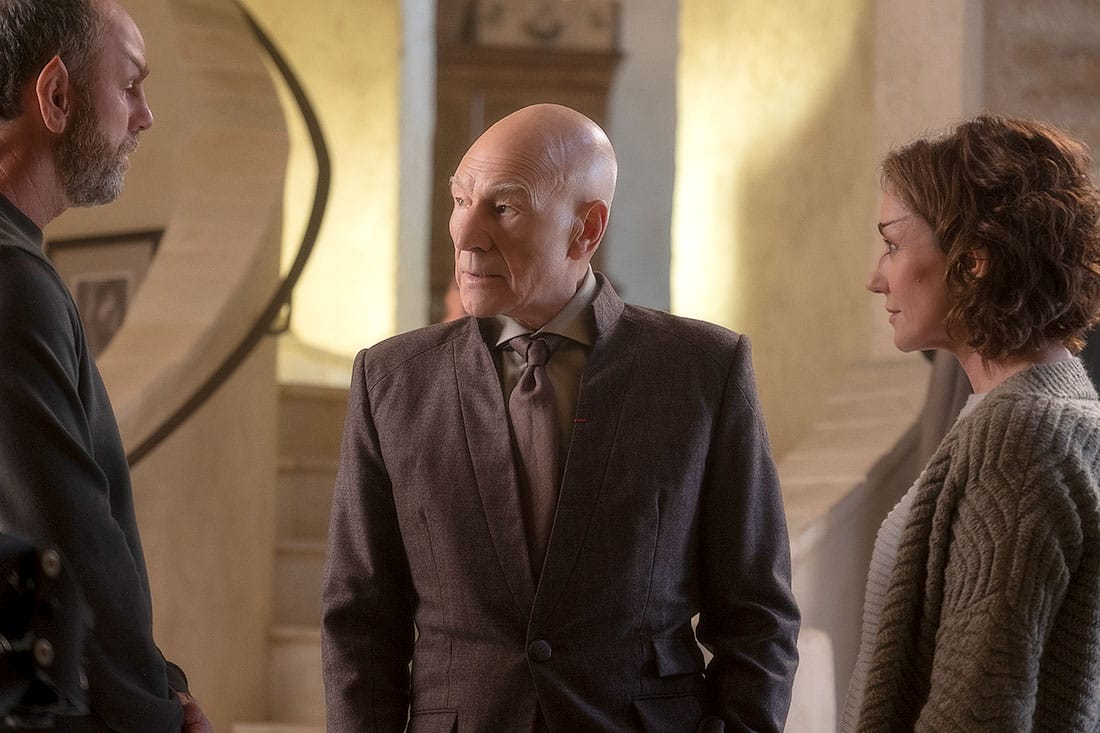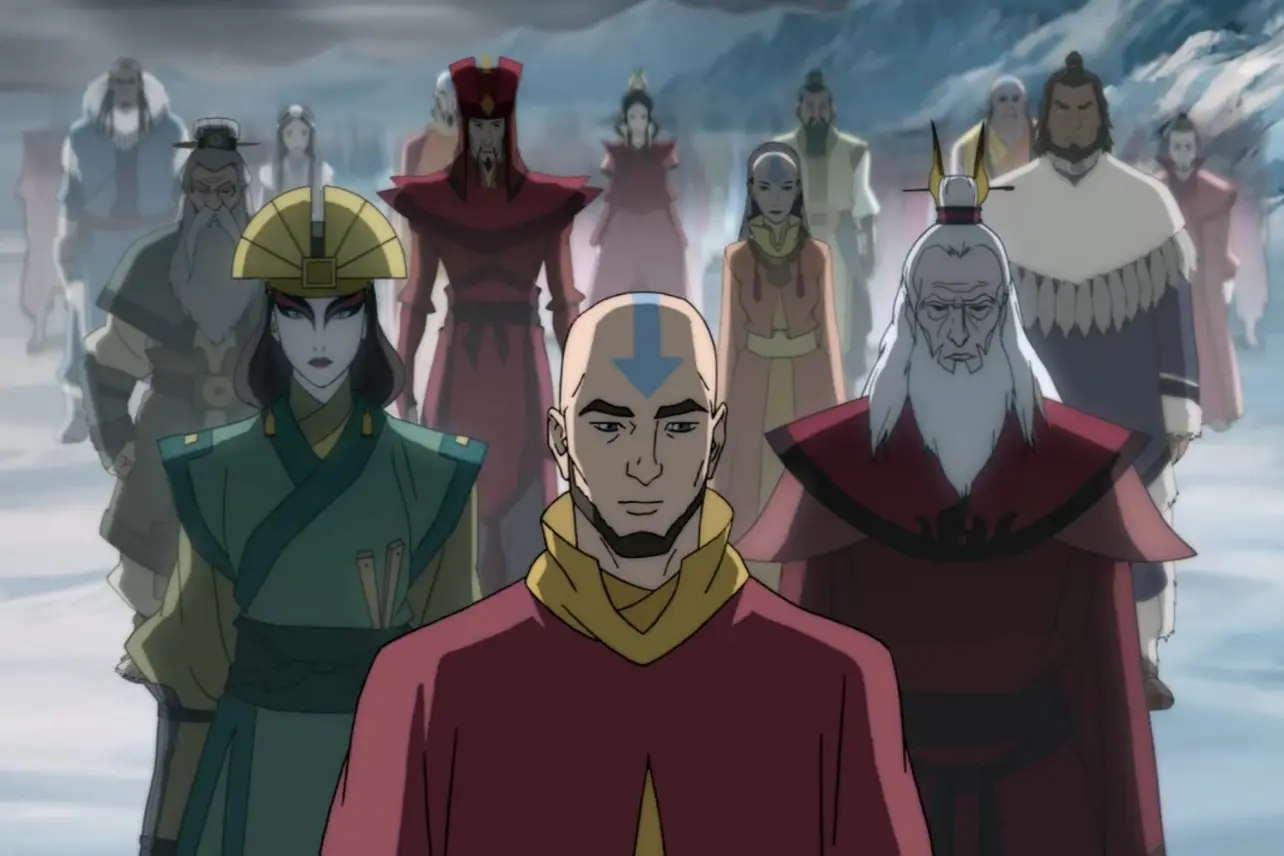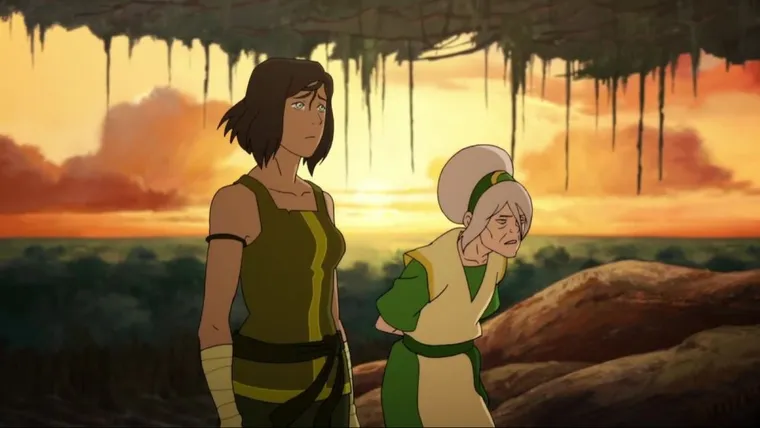I should get this out of the way up front: I'm the weirdo who's almost always in the camp of the stranger, looser, sometimes less consistent follow-up to classic films and television shows. I'll chew up an hour of your time going to bat for Angel over Buffy the Vampire Slayer or calling The Matrix Reloaded the best of the original trilogy (and Resurrections the best of the whole series). Don't even get me started on Star Trek: Deep Space Nine. There's something uptight about stories setting up a world and the heroes who populate it. While often necessary to get the whole thing off the ground, a spin-off or sequel can leave that behind with the wind of success in its sails.
I hope it's clear just how kind an audience I can be even to widely disliked returns to beloved stories, because today I come not to praise our legacyquel-heavy entertainment landscape, but to bury it.
The Legacyquel of Korra

In April 2012, Michael Dante DiMartino and Bryan Konietko launched a sequel to their hit 2005 animated series Avatar: The Last Airbender, called The Legend of Korra. It was the kind of thing anyone could expect from a success as big as Avatar; you kept the train going as long as the audience was showing up. Korra told the story of the Avatar that followed Aang, and was set 70 years after the end of the original series. Over the course of the show, we'd meet some of the surviving members of Team Avatar, as well as the children of those beloved heroes.
All of Hollywood, at that moment, was entering the era of a very specific kind of sequel, mixing the aging cast of original hits with new, younger crews to whom the olds could presumably pass the torch. Indiana Jones and the Kingdom of the Crystal Skull was an early stab in this direction, setting up a (now abandoned) attempt to turn Indy's son Mutt into the new Doctor Jones. This was a movie still balanced primarily in Indiana himself's direction, with just a soupçon of legacy thrown in. On the other end of the scale, 2009's Star Trek was primarily interested in its rebooted cast, but used little a Spock as a treat to lend the new universe continuity legitimacy.
Arguably the first true pop culture legacysquel was 2010's Tron: Legacy, but the movement wouldn't pick up steam until 2015 gave us a pile of them: Star Wars: The Force Awakens, Jurassic World, Terminator Genisys, and Creed. Given the box office failure of Tron: Legacy and its subsequent series cancelation, this makes The Legend of Korra a sort of inception point for what was to come. Korra, despite Nickelodeon's best efforts, got to tell its story all the way to the end, giving us four full seasons of the eponymous character's journey into Avatarhood.
As with so many trends in Hollywood, there isn't any inherent problem with the idea of a legacysquel. In fact, I'd enthusiastically argue that it's a better template for returning to a story than a reboot or (worse) a requel. A legacyquel has the opportunity for something so few sequels otherwise have the space to do: move the setting and story forward, while using the characters we already know as a narrative bridge into this bold new world.
Korra took exactly this approach, and in doing so made the case for the format better than any critical essay ever could. The world that the new Avatar inhabited was packed with the consequences not just of Aang's story, but of the consequences of those consequences. Things had not stayed static in the decades since the defeat of Ozai, and part of the joy of the show was getting to explore this world all over again. Even its primary setting of Republic City didn't exist yet in The Last Airbender's time! Every choice made through its four seasons leaned on Aang's legacy not simply as direct callbacks to specific events, but as the spark of 70 years of continuity that led to Korra's moment, and then allowed her, her friends, and their antagonists to make new choices that irrevocably pushed the setting further. By the series finale, "The Last Stand", Korra had become Avatar of a world Aang barely recognize.
If The Legend of Korra got it so right out of the gate, what happened with the legacyquels since? The term has a (mostly) deserved bad name, and new films that even smell like one lead to anguished groans that only get louder with every uncritical trailer reaction video on YouTube by weird fans performing screams and tears to the most rote and predictable reveals imaginable.
Jean-Luc's Return Retreat

As Covid was just getting underway, the nascent CBS All Access streaming service (now Paramount+) launched Picard as a part of its attempt to revitalize the Star Trek brand. Its first season, while having received a mixed reaction, followed in Korra's most important footsteps. Sure, the series was centered on the most legacy of legacy characters possible in Jean-Luc Picard, but its focus was on who he had become in the two decades since we'd last seen him. Beyond a handful of The Next Generation cameos, Picard largely focused on a new cast of younger characters that became Jean-Luc's allies. More importantly, most of the characters were entirely new, without any connection to the older series' cast. Even the one character directly pulled from a former show, Voyager's Seven of Nine, was one so underserved in her original run that the writers' respect for her and Jeri Ryan's performance gave Seven fresh life. Everything, from the problems facing the Federation to the antagonists Picard and crew had to face, stemmed from the evolution of the universe since we'd last seen it.
Unfortunately, there were two more season of Picard to come, and with each step forward, the focus and intent of the show turned into something else. After a second season that unsuccessfully attempted to keep the new cast members around for what was, otherwise, a return performance for two Next Generation antagonists (Q and the Borg), Picard opted for a final season that played in the absolute opposite end of the legacyquel pool from The Legend of Korra.
That new, original to the show cast? Gone, with one exception. Plot threads, including a massive open thread left from the season 2 finale? Vanished. Antagonists new to the series and to the world? Replaced with not one, but two return villains from older Trek shows. What had once been a show about the later years of Picard's life shifted form into a nostalgia tour reuniting the full cast of The Next Generation, whether those characters had died or not.
In its third season, Picard not only brings back the Borg again, it pairs them up with another legacy villain in Deep Space Nine's Changelings. Facing off against them is a cast of characters made up almost entirely of legacy characters. Not counting the return of Raffi (the only Picard-created character left) there are only two original characters with any real role to play in the story. One is only new insofar as you consider "son of two existing characters" original, and beyond that serves primarily as the season's MacGuffin. The other is there to be wrong all of the time as he gets in the way of the main characters, up to and including relentlessly deadnaming Seven of Nine.
Instead of a world build upon and in spite of the consequences of earlier shows and the time since those shows ended, Picard inverts itself into portraying a Federation populated only by former characters. No one has made a single friend since we last saw these people. No Starfleet officers outside of those we've already met have filled a single important role. No new threats exist, no cultures have changed, and there is nothing strange or new to discover. It's a show that climaxes with the the full crew of the Enterprise D teaming up to save the Federation on the rebuilt Enterprise D, complete with a detail-perfect recreation of the original bridge set.
In all the ways that The Legend of Korra was exemplary of what a legacyquel could be, Picard serves as its Vaatu, its Dark Avatar. It's a failure that's so striking, perhaps, because it started in a place that seemed to understand how to engage with the concept. While there are plenty of hollow nostalgia sequels one can find these days, there isn't enough successful in most of them to give the purchase necessary to really critique them. Is there a more interesting evolution of the setting one could imagine for the Jurassic World films? Sure, but you would have to invent a counterfactual universe to compare against if you want say more than, "This is shallow and bad." With Picard, we had that evolution of the world, there were choices made that shined light on some of the Federation's less admirable choices, and how even a hero like Picard will fail over a long enough period of time.
What Even Is Legacy?

I'm saying nothing new when I note that the goal of most legacyquels isn't to deal with legacy at all, but instead to let people believe that the things they loved as kids have aged with them without changing more than their hair color. Sure, you got old, something like Picard season 3 says, but not only are you just as awesome as you were then, you're awesome in exactly the same ways.
It would be easy to stop by saying the obvious, that this is bad storytelling, but I think that misses just how vital the idea of legacy can be when returning to a world to tell a new story. The shallow, shambling legacyquels being pumped out to rake in the cash of Gen Xers struggling with our own mortality and impending cultural irrelevance obliterate the opportunity to meaningfully wrestle with what comes after the curtain closes on the heroes of our youth. A story that ends on the defeat of Fire Lord Ozai and the victory of the Avatar is one that risks freezing its hero in amber. We can, and do, wonder about what the next adventure Aang might have is, but the Aang in our heads is a static one that can only do battle to return the world back to the status quo of those final moments.
The effect of growing up with dozens of stories like this is a view of heroism hinging on people who struggle with problems, but overcome them for all time. Aang had to grow into accepting his responsibilities, and overcome his fears of facing an enemy representing the one that had killed his people, but that's all done now. Now he's a hero. Now he's finished.
Only that isn't how people, heroes or not, work. It's totally okay to stop a story at that point, but it leaves a lot of room for tales that ask what comes next. Not in a Star Wars Extended Universe kind of way, where the draw really is just to see barely-changed versions of our protagonists cycle through the heroic journey a few more times, but where we see how they can and do fail. How the strengths that got them through the war may not be what they need to win the peace, and how the world may grow beyond the need for them at all.
Certainly the most important choice The Legend of Korra makes is to allow itself to be its own story, about things not directly connected to the struggles of its predecessor. That's the easy part, the table stakes of a sequel. What Korra does that's special beyond prioritizing its own story is treating the time between the end of Airbender and the start of its own story as a fraught history of imperfect people doing their best to mend a broken world.
One of the canniest choices the writers make is portraying both Aang and Toph as really dodgy parents. Like many legacyquels, we meet a fair number of the children of the last generation. Unlike most of them, Korra's next generation are deeply damaged by the pressures of living in their parents' shadows. Aang's favoring of his one and only air-bending child leaves his other children resentful, and turns Tenzin into a perfectionism-seeking neurotic. Toph having no capacity to be a stable presence in anyone's lives leaves both of the Beifong sisters bitter with her and each other.
The point of these choices isn't to create a revisionist view of the people we loved, but to demonstrate just how complex lives are across enough time, and to allow the world created by these people to reflect that complexity. On a storytelling level, it allows the world to progress without being forever in the shadow of the first group of characters we meet. On a thematic level, it opens the door to ideas that would land with less force if we didn't know both the problematic heroes of yore and the problematic protagonists of today.
Where the failure of the legacyquel is most regrettable, though, is on a human level. Korra gives its audience something that's very hard to pull off, the gift of empathy across generational divides. Where raw nostalgia is a lie – a trap into which people like me can step willingly to avoid facing the fact that the world is going to move on from the things that matter to me – pretending nostalgia has no value is also a lie. Korra holds both truths in its head at once: what Aang did was good and mattered, but Aang isn't what the world needs today. It says that what was good for us olds is maybe also a little bad for the young if we expect them to be no more than reflections of our own desires.
Compare that to the endgame of Picard, and you can see what I mean. The final threat the Federation faces is one where all young people are taken over by the Borg and only the old timers, on their super nostalgia ship, can save the day. It's a story where even death can't stop the heroes of our childhood from being the only people that matter. There may be a torch to pass at some point, but that's after we save you all from yourselves one last time.
The legacyquel has become the clearest example of how deeply nostalgia has corrupted our pop culture, but it didn't have to be that way. It could have been our way out of it, a metatextual path through the dark forest separating us from the people we need to give the world to. We could have wrestled our way through the joys, the disappointments, the maddening complexities of legacy in a world overwhelmed by corporate domination of media together. Instead, we just rebuilt the Enterprise to fight the same battles all over again.



